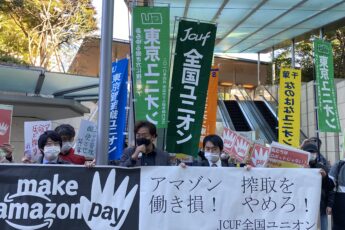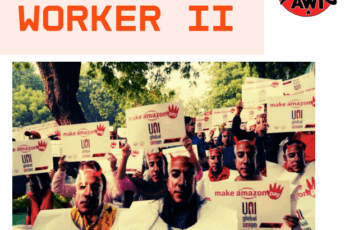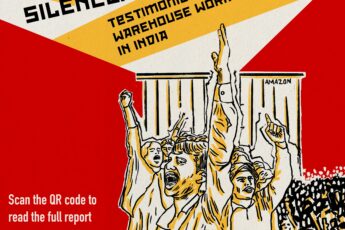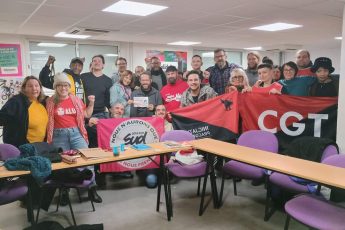
We publish an interview with Ryan and Destiny, who work at Amazon and are part of CAUSE (Carolinians Amazonians United for Solidarity and Empowerment), a worker-led union born during the pandemic to organize against exploitation, for higher wages and better working conditions within Amazon warehouses in North Carolina. Ryan and Destiny describe the unbearable work pace in their warehouse, RDU-1 in Garner (NC), where many women have experienced miscarriages, many faint in the effort to achieve the goals imposed by employers, and where racial, sexual, and gender hierarchies work as tools for disciplining and dividing workers. In their warehouse, the majority of low-ranking jobs are performed by black and brown workers, and the systematic racism they face has led them to build alliances with other black worker groups outside of Amazon, believing that racism and exploitation must be fought together. They also show the difficulty of organizing against Amazon in the United States as a grassroots union and the lack of support that they received from bigger unions. In recent years, they have engaged in various forms of international organization and solidarity, both with workers from other Amazon warehouses in the United States and with workers from other countries, identifying the fight against exploitation and racism they experience as their common struggle. Organizing across the US is already a transnational practice for them because it allows them to disclose and fight against how Amazon utilizes local conditions and differences in legislation to undermine workers’ power. This awareness shows their capacity to engage in an expansive process that does not stop at the door of the single warehouse but starts with concrete issues to create connections, showing how the organization can open the way for all those who want to mobilize within Amazon and beyond. Since the beginning of the bombing of Gaza, some of them have also joined ceasefire protests, recognizing a common history of oppression between black and Palestinian people. You can follow CAUSE on Instagram and X.
TSS: Can you tell us about what C.A.U.S.E is, how it was founded, why, and when?
Rayn: CAUSE was started in the middle of the pandemic. At first, Amazon workers were given a $2 wage increase. We were also given double overtime for any hours worked over 40. And with the uncertainty of the pandemic, we were also given unlimited unpaid time off: if we felt sick, we could leave. If we had loved ones that were sick and needed our care, we could leave. However, after 2 months, Amazon rolled back all of those pandemic benefits, at the same time when Jeff Bezos became the first human being in history to reach 200 billion dollars. In January 2021, I was asked to go to a part of the warehouse that I knew to be a COVID hotspot, not because Amazon management and personnel had told us, but because as workers we were trying to protect one another. My wife has severe asthma and I refused to go there. Being a lover of history, it was almost like a “Rosa Parks moment”. I just wasn’t going there, that didn’t sit well with me. So, I left early for work again and I did the only thing I knew how to do. Growing up with a Christian grandmother, we had to pray for everything. So, I prayed a very long prayer. When I got up from that prayer, I heard a voice speaking to me. All I heard was one word. Organize. Organize. Organize. I had no idea what that meant. So, I reached out to an elderly lady, a worker named Mary Hill, and when I explained to Mary what I felt was my purpose at that moment, she told me that what I had experienced was something that she had already witnessed in the Jim Crow South growing up as a little girl. For me, CAUSE was born out of two ingredients. That was a moral need: we were being immorally treated. And a spiritual need. And that’s what gives us fuel.
Destiny: CAUSE is a grassroots worker-led union that we’re developing independently. It’s led exclusively by the workers. We have community support that extends our capabilities, but it’s all on us. We’re in the state with the second-lowest union density. There’s only about 3% of people in North Carolina are unionized, which means that the unions are really weak. And we are fighting against a company that has the money of multiple countries.
TSS: In which warehouse do you work? What are the working conditions there? What are the main problems: working hours, wages etc.?
Destiny: Our warehouse is the RDU-1 facility in Garner, a suburb of Raleigh, North Carolina. The first issue is pay. We do not receive enough money to live off or to support a family. Second, the pace at which they require us to work makes it very difficult to avoid injuries. This results in a high turnover rate, and Amazon operates in a manner that exposes people to injuries. Consequently, individuals often resign because they are unable to cope with the conditions. This leads to a third issue, which pertains to accommodations. We work in an environment that is disabling and yet we face repercussions for being disabled. It is a predatory operation because it exploits particularly those individuals who are willing to work for low wages in the first place. Instances of workers fainting on the job occur regularly due to excessive exertion. Over a two-year period, ambulances were called to our facility 263 times, averaging once every three days. When workers faint, they are instructed to continue working. Moreover, we do not receive sick leave; instead, we must accumulate time off. Initially, we might be granted 10 or 20 hours of time off, but thereafter, we must accrue time off based on the hours worked. In addition to this, the breaks are not long or frequent enough. Amazon has such intense surveillance that they literally track every second of what you’re doing. You’re supposed to pick 350 orders, and if you get less than 300 an hour, a manager is going to come by, watch you work, and ask you why you’re working so slowly. And the thing is, the difference between 350 items and 300 items is like one second per item. But losing a second per item can get you fired. So, it’s the rate, it’s the workplace safety, and it’s the surveillance that all create the speed that makes two-day shipping possible. I’ve had conversations with women who said that they’ve had miscarriages working at Amazon. Last week, I saw a woman, very pregnant, walking up the stairs, trying to catch her breath. All the jobs upstairs are strenuous, you have to climb stairs all night, so there’s no safe way for someone pregnant to be doing this job.
Ryan: I came across a young lady who engaged me in conversation and she started crying, explaining to me that she was with our union efforts because she had a miscarriage on the floor. We tried to get this young lady to talk to the media about it, but with the trauma that came with losing her child on the floor, she went through a great deal of depression and decided not to continue talking. Just last month, in our Voices of Empowerment newsletter edition, we featured a worker in my department, a young lady who is pregnant and who passed out. And I don’t know whether to cry or curse because it makes me angry. This is why we’re organizing. It took our safety team forever to get there. And when they finally arrived, they were trying to get us to go back and work, but we did not want to. The majority of the people in charge of our safety are white. Most of the workers in the building are black and brown. So, you have all of these white safety personnel who have no idea what they’re doing and don’t even think to call 911. This was a young black sister. Due to the history of how black women have been treated, we refused to leave until we knew that the first responders we had called arrived in that department and were assisting her.
TSS: How do you think that racism affects the organization of labor force and exploitation in your warehouse?
Ryan: I’ll give you two quick points. Think about, for example, Chris Smalls. When he decided that he was going to organize JFK8 in New York, a memo was leaked in which Amazon executives said that they were not going to make him the face of unions for Amazon because he was ignorant. What is sad is that Amazon plays on those racist stereotypes. The other thing that a lot of people don’t realize is that Amazon discriminates against four distinct demographics: women of any color, older workers of any color, disabled workers, and minorities. If you generally have a chance to move up into that company, it means that you’re probably a white male, and if you dig deep into the data, it is clear that our leadership does not reflect the diversity that exists in the building. The majority of Amazon workers in our warehouse are black and brown women, but there are no black women who are decision-makers, who sit with Andy Jassy and Jeff Bezos in Seattle or Washington. So, yes racism plays a major role. There was a study that showed how Amazon tends to gravitate towards communities where gentrification is taking place because they know that in those places the majority of black and brown people will have to leave the neighborhood because of the high costs of the new homes and will need a job.
Destiny: 60% of the workers in our warehouse are black and brown. When you come to Amazon, they tell you that there is room for upper mobility, but if they are promoting people, they only promote certain people, that is white people.
Ryan: I would like to add something about Chris Smalls. The young black man had helped Amazon open up three new facilities. He was what you call a process assistant (PA). He applied as area manager over 49 times and was denied every single time. Another way in which Amazon plays on racism is through what we call affinity groups. They have black employees’ network, Hispanics, Asians, and LGBTIQ+ communities at Amazon. And it occurred to me that that was a great union-busting tactic. It keeps everyone in their tribes. It makes you feel important. It makes you feel like a part of Amazon. But what was interesting, even in our warehouse, is that when these groups began to overcome isolation they were hindered. We have a beloved area manager named Muffin, she is a young African American woman. Everyone has been pushing for her to go to the main office. They refuse to promote her. Muffin had built up such a good reputation that, despite my initial reluctance to attend affinity groups, I started going to see what was happening. She had built it up to the point where hardly anyone was attending these meetings, and then suddenly it started attracting close to 100 people and continued to grow. However, Amazon decided that they would no longer allow people to leave the floor and attend these meetings; they now have to be held after work. As a result, attendance is dwindling once again. I have a white friend who is a union member and a part of CAUSE. He’s older, so he falls into one of the discriminatory groups at Amazon. He applied to be a PA, but he keeps encountering obstacles. He told me, «They want me to join an affinity group, but I’m a white man, and I cannot find any group that I can join». This made me wonder, and we’ve even asked this question before: if affinity groups are so important to Amazon, why don’t they have groups for white employees? The response we received was astonishing; they literally admitted that the reason they don’t have one is because the white employees at Amazon hold the majority of leadership positions.
TSS: Talking about the impact of racism on the way Amazon workers are treated, were you engaged in the Black Lives Matter protests? Do you have any relationship with anti-racist groups outside the warehouse and did you receive any political support from them?
Destiny: First, I’d say that, as Ryan mentioned, when he decided to organize, he remembered that there were people standing outside leafleting. Well, the people who organized that leafleting were a group called Black Workers for Justice, and they are an independent union, and they’ve been doing it for like 40 years at this point. So, it’s not like Black Lives Matter specifically, but it is a connection to the black liberation struggle. Black Lives Matter is just a current iteration of a very long struggle for black people and not the strongest group out of that. They have, admittedly, a social media-mobilized base, but mobilizing and organizing are different. As for organizing: you start with a goal in mind and make it happen, as opposed to just responding to what’s wrong. Our organization is worker-led and not in association with the Black Lives Matter organization, but we are a part of the black liberation movement. So, for example, we are connected with the Union of Southern Service Workers, which represents low-wage workers who are mostly black and work jobs with a high turnover rate. You might be working at McDonald’s one day and Amazon the next month, or have multiple jobs. And we are in solidarity with this organization. We also collaborate with the Poor People’s Campaign, which is another black movement trying to essentially continue what Martin Luther King started before he was assassinated. So, that is the sort of black liberation movement that we’re connected to.
We are getting surprisingly little support and solidarity from the big unions. A lot of our help doing legwork comes from volunteers, who are almost all from leftist organizations. There’s a reason why Amazon got to be the second largest employer in the country remaining completely unorganized. It is the big unions that let this shit happen. They aren’t organizing new places. They aren’t doing the work that we’re doing. But in order for them to help us, we have to basically declare loyalty to them. Even that could be fine if they would help us, but they don’t want to. What they really want you to do is organize it yourself and then give them your dues and sovereignty at the end. They have a very different idea of solidarity than rank-and-file workers do.
Ryan: When I first heard the word “organize”, it opened up a new world for me that I had never experienced. In these three years of organizing, I can genuinely see with conversations with these larger and more traditional unions why people have a bad taste in their mouths for unions, especially in the South. That is why we decided to be 100% independent and a grassroots movement. Organizing is our passion and purpose and the treatment that we get from some of these larger national unions is the same treatment that we receive in the warehouse from those who are in leadership and those who are in the main office.
TSS: Are you in contact with workers from other warehouses in the US or abroad?
Destiny: Last year we met in Atlanta with other Amazon workers both from the US and from Canada, and we agreed to do something on Cyber Monday. So, we did a ULP extension [Unfair Labour Practice] picket line, started by the Palmdale Amazon drivers in California. A ULP extension picket line means that as long as the strike is still going on at the original facility, they can extend the picket line to other facilities, basically anywhere in the country. And this gets around something that is illegal in the US called a solidarity strike. We can’t just go on strike because Amazon is doing something wrong to another building. But if you bring someone from the original picket line to your building and then they have a picket line, then you can have a picket line. So that was literally across the whole country. Because the US is so enormous and every state has different laws, and also because every warehouse is internally very international, organizing within Amazon is like organizing internationally. The Labor Notes conference in Chicago this year should offer us the opportunity to continue the coordination work.
Ryan: I’ve personally spoken to Amazon workers throughout the United States and also in Europe and I found out that Amazon literally uses the exact same playbook in every nook and cranny of the globe. This is a monster like the world has never seen before. That’s why we have to tame this monster. Amazon is organized. Their lawyers are organized, the corporation is organized, but the real power lies within workers. And so, we have to share our different methodologies to fight Amazon, on a continental and international scale, but we have to find a common ground to tame this monster called Amazon.
TSS: A final question. In the last months thousands of workers and different unions joined the big demonstrations across the US for the ceasefire in Gaza. So I was wondering if you took a stand against this war and if you participate in any of these demonstrations against the Israeli bombing of Gaza.
Destiny: I was in the protests for a ceasefire. As black people, we too are colonized. So I am, of course, for a free Palestine. CAUSE has not taken a stance on Palestine, and I would say that this is, for our purposes, strategic because at this stage of our campaign, we are building the consciousness that you have the power to not work until you faint, so we have not raised our coworkers’ consciousness to the point where they are ready to support anti-colonial struggle. But CAUSE has also been down for international solidarity. For me material support is more important than solidarity demonstrations.





